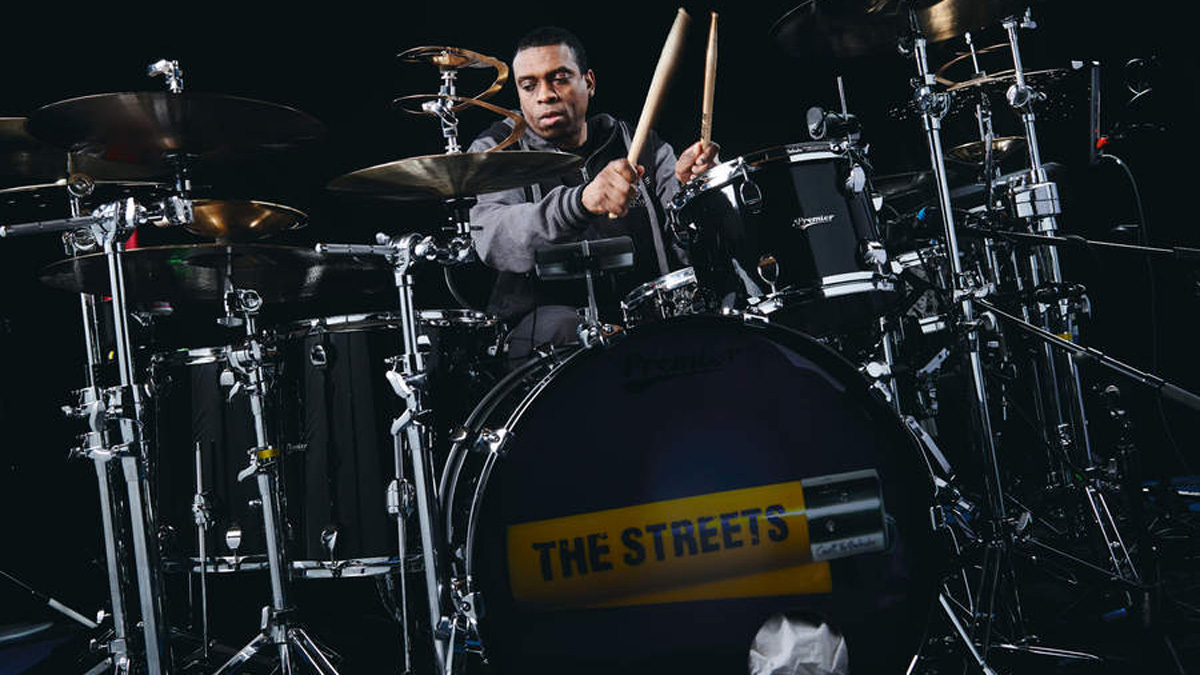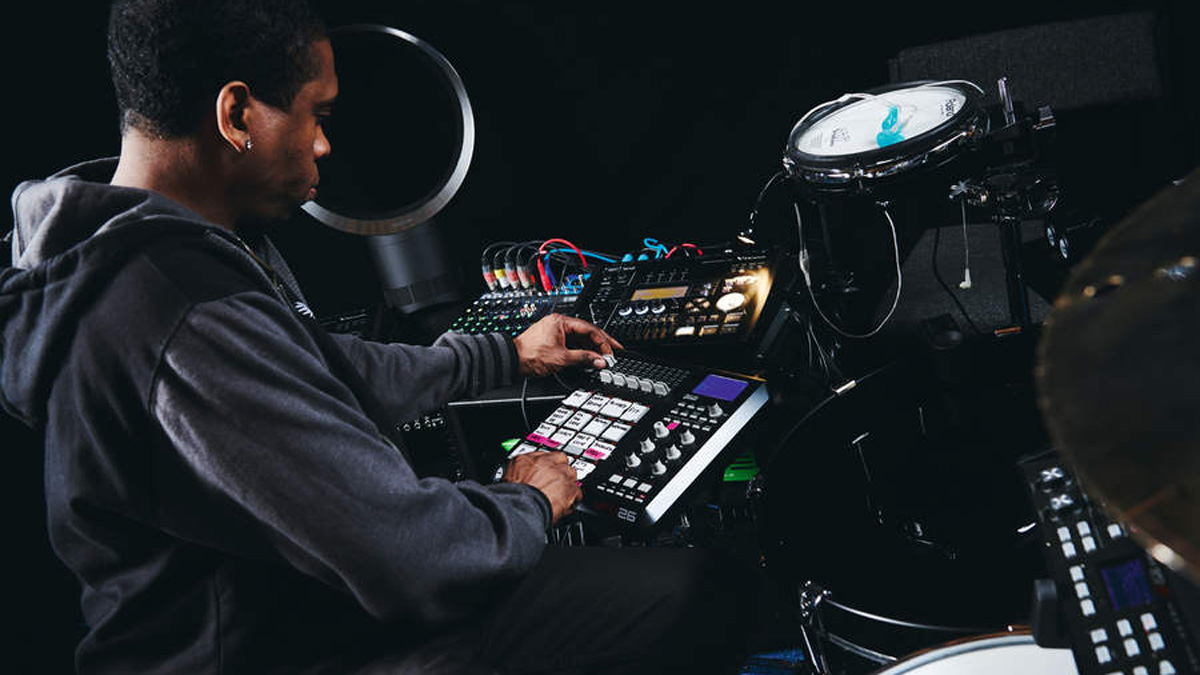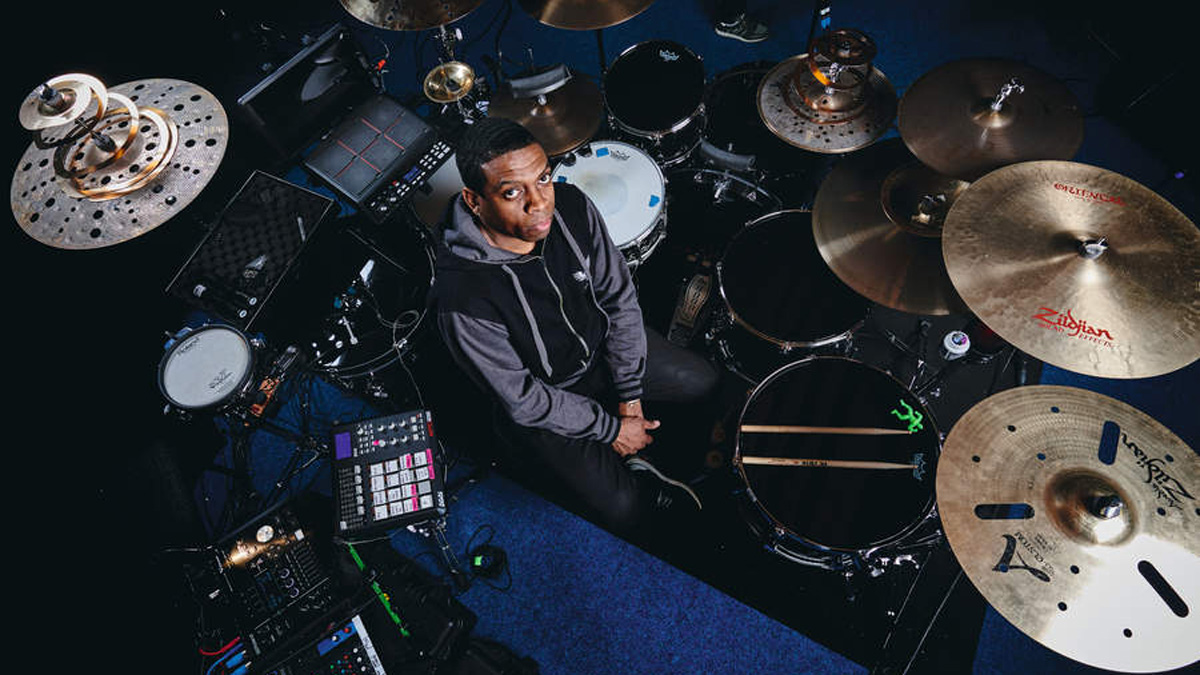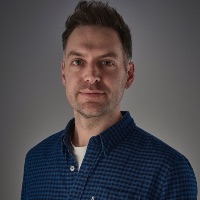Cassell The Beatmaker: "I go from touring to teaching to production; If I was just playing drums I’d probably be working in Sainsburys"
From touring the world and producing hits to mentoring and inspiring the next generation

The musical chameleon
If ever there was a person who embodied the phrase ‘musical chameleon’, then London-native Cassell The Beatmaker is it.
From the tender age of 16 the young drummer was recording and touring professionally with everyone from hip-hop artists to funk legends. Then, through a combination of raw talent, immersion in the London hip-hop scene and embracing every opportunity, Cassell was able to add production, songwriting and artist development to his ever-growing CV.
It’s a range of skills that have kept him incredibly busy. Some of Cassell’s career highlights include scoring a prestigious Ivor Novello award for co-writing and drumming on Plan B’s hit album The Defamation Of Strickland Banks, and working with artists as diverse as pop star Natasha Bedingfield, award-winning rapper Akala and French Canadian singer Garou, with whom Cassell has produced two multi-platinum albums.
These successes inspired Cassell to share his experiences with younger musicians. Presenting workshops in the UK and beyond, and through his own artist development platform In The Making, he has been arming aspiring musicians with the tools to thrive in the industry. It’s an area he wants to grow in the future.
Cassell’s drive to inspire has rubbed off a little closer to home too - his son Bailey is already logging his own successes in the music world. At just 11 years old he snagged a feature role as the drummer in the School Of Rock musical, bagging a prestigious Olivier award in the process. Now, under the watchful eye of dad, Bailey and his School Of Rock bandmates are climbing the ladder with their own band, Now As One.
Witnessing Bailey chop it up on Cassell’s kit during our photoshoot, it’s clear he’s been paying close attention to his dad. Between spinning multiple drumming, production and artist-development plates, Cassell has been busy rehearsing for The Streets’ first tour in seven years. He’s clearly relishing the prospect of returning to a gig he first landed in 2009 and this seems like an appropriate place to start our conversation about inspiration, relationships and the importance of making people dance…
You’re currently rehearsing for The Streets’ hotly-anticipated tour. How has it all been going?
“It’s been brilliant. It’s been a long time. Everybody’s aware that our show has got to be so much better than the last one. We watched the Melt Festival [The Streets’ last gig] and it was really good. I think everybody aims to do that extra level. There’s a lot of exciting things happening in the set so it’s gonna be really cool.
"It’s just really good to be back with the boys. Mike’s been brilliant, so inspirational. He’s been coming to all the rehearsals. He’s been throwing all these ideas in and we’ve been really gelling. Being in this band has reminded me why I wanted to be a musician.”
What do you think it is about your playing that made Mike want to work with you again?
“Mike could have any drummer in the world. It really is an honour that he’s asked me to come back. It just shows you don’t have to be the best drummer in the world. I don’t think I’m the best drummer in the world. I’m not the clinic drummer.
"I believe that when you’re playing in a band it’s not about clinic drumming anyway, it’s about making people dance. You’ve got to hold it down so the main person can do what they do, and it all works together. That’s how I see music.”

You have a new Premier kit for the shows?
“Premier have been really loyal to me. Colin [Tennant, Premier’s Creative Manager] has been amazing. Before I even signed with Premier they sent me two kits. When I did Plan B they didn’t have a Purple Sparkle Fade so they made one for me. Colin gave me two kits because I was doing Plan B and The Streets at the time. They got me everything in time for when I needed it.
"This new kit sounds even better than my last kit. They’re a British company, my first ever kit was a Premier Royale - it all made sense. Their support has been amazing in every single way - the drums, even just helping with social media, coming up with new ideas, Colin comes to my gigs. Then, when Bailey started doing School Of Rock, they supported him too.”
You have an extraordinary cymbal set-up too?
“I went down to Zildjian and Tina [Clarke, International Artist Relations Manager] hooked me up in a massive way. Every time I’m with The Streets I experiment. My last set-up was pretty crazy, but this is even crazier because of the spirals and the effects.
"The kit’s like a spaceship. I know my drum tech’s looking at me, knowing he’s got to set it up. He’s trying to urge me not to use more cymbals. I have another 10 cymbals in my bag. Who knows!
"The reason I stuck with Zildjian is because Tina gave me stuff when she didn’t even know who I was. I’d just started with Plan B and my tour manager rang her up. She sent me seven cymbals. To get that from somebody who didn’t know how I played, she just took the word of my tour manager. She didn’t have to do that. I built a relationship from there. Vic Firth, Remo, Roland the same.
"I think the key is to be loyal to everybody who supports me in that way. Don’t jump around. You can’t just keeping taking s**t off people. Any chance I get to promote the brands, I do, because I believe in them.”

Talent spotter
You’ve achieved a lot through your career so far. Talk me through some of the major stepping stones that got you to where you are today?
“My first major tour was with a guy called Keziah Jones. That was a mixture between Afrobeat and funk. I toured the world with him. It was only three of us and it was the best experience. It was like my apprenticeship of drumming.
“Before that I was in a jazz/funk band called Quite Sane. We won Capital Radio’s young band of the year. Our gigs sold out and Gilles Peterson supported us. Then I got a Prince’s Trust grant that I used to set up my first studio. Then I started doing this thing called The Apricot Jam which was like a hip-hop event.
"All the MCs and hip-hop people of that time would come in and we would back them as a band. Then I did this thing called Aeroplane Man which was still a hip-hop environment but it was theatre.”
What age were you when you started playing professionally?
“I didn’t have a drum kit until I was 18, but I was playing professionally on the circuit when I was 16. Imagine not having a drum kit and doing that! I would go to my friend’s. His dad had a Hayman kit in the shed. I’d go there from 11 in the morning and leave at 8 o’clock in the evening.
“I was also the first drummer to do [live music and artist development platform] I Luv Live. Jade Richardson, who signed Ms Dynamite, started that. There was no money in it, I did it more for her as a favour, but it actually turned out that she did me the favour. That’s where I met Plan B and Akala.
"I spent the next 15 years with Plan B. I co-wrote his Defamation Of Strickland Banks album. I got my Ivor Novello award for that. You can do things and they might not seem to be big, but it’s what you get out of it. If Jade hadn’t got me to do I Luv Live, I would have never met Plan B or Akala.
"They are the two artists I’ve been working with for years. Then I met The Streets through doing Plan B.”
You’re a big believer in sharing your experiences and inspiring young people. Tell me about some of the ways you’ve been able to pursue that?
“I didn’t like teaching at all, but once I started doing it I loved it. I do workshops in Hong Kong. It’s not even all drum-based, it’s more production and songwriting. There’s a class of kids, they put themselves into bands and some of them haven’t even played music.
"They have to learn two covers and two originals, then they do a show at the end of it. I’m working with the kids throughout the week. By the end of the week you would never know some of them haven’t played music before, they’re that focused and that into it. I’ve been going there every year for about four years.
"The person that runs that is Marcel [Pusey] who’s from Bassistry Arts. We’ve been asked to go to some other schools in Singapore. It’s really satisfying and I want to do it more. This is why I set up the ITM.”
I’ve got this knack for telling when someone’s gonna do well. I told Plan B he was gonna do well when he didn’t even know
Your own artist development scheme?
“Yeah, In The Making. It’s basically about developing young artists. Some people want to sign these artists up, make them do things they don’t want to do and they get stuck in these deals. I’m trying to get funding.
"I get flooded with emails from kids asking, ‘Can I come in the studio and work with you?’ I’ve only got so much time and time is money, so I need funding to be able to do it. It’s not just about doing the music, but it’s about getting your music out there.
"I have a team who do the social media, image and everything. We set them up to do whatever they want to do. They can stay with me or go do their own thing. I teach them what I’m doing, I show them my techniques. This is what it’s about. Passing it on so it’s easier for them. Nowadays you don’t need a record deal, you can do it yourself.”
Talking of young talent, your son Bailey is at the start of a very promising music career.
“He was always on at me saying, ‘Dad, I want to be in a band, I want to play with kids my own age.’ It was really hard for me to find anybody. School Of Rock was this perfect opportunity. He’d never done any acting or singing. He just knew how to play drums. I wasn’t really expecting him to get a main role to be honest. I hadn’t seen him do anything like that until I saw the first show. I couldn’t believe it.
"Now he’s acting and singing just as good as all the kids who were trained. Then he wins an [Olivier] award which is equivalent to my Ivor Novello. The ceremony was held in the Albert Hall. That’s the same place I did a show with Plan B. I’m seeing him in exactly the same place that my drum kit was set up, doing a gig to the same amount of people.
"He was 11 years old. I started drums when I was 11! I was really proud.”
Now he’s pursuing a new band, Now As One, comprising members of the School Of Rock band?
“We’ve had a major management company interested in them. They have a second video ready, they’ve finished six songs. They’re ready to roll. They’ve been asked to do a few festivals off the back of one video.
"The band can play. It’s not a gimmick. Toby on guitar has five million views on YouTube. He’s just done Ellen. The band’s first appearance on TV was London Live. That’s without management or anything.”
You must have given him some expert guidance?
“I want Bailey to take everything I’ve taught him and be better. I want him to inspire other kids his age, whether they’re doing music or not, telling them that if they believe in something they can do it, no matter what. It needs people of an older generation to support them.
"When I was at school, music was down at the bottom of the list. Now my old school has me in their archive of successful people. Music helps with everything else - maths, coordination, so many things that people overlook.
"It’s about inspiring kids to do whatever they want to do, whether it’s music or being head of a bank. The whole point is you have to be inspired and motivated to do it.”
Away from the drums you spend a lot of time in the studio. What’s your favourite aspect of producing music for other people?
“I just love production. I’m 50 percent drums and 50 percent production now. When you’re in the studio with artists or musicians it’s really creative. I’ve worked with Natasha Bedingfield and a guy called Garou - he’s the male version of Celine Dion. We did two albums with him and they both went double platinum.
"Now I’m working with people like Dionne Bromfield, who is Amy Winehouse’s goddaughter, and a new artist called Josh Barry. I did four tracks with him and then performed with him during the Glastonbury Emerging New Talent competition. He won it. He’s gone on to work with Rudimental.”
You seem to have an ear for rising talent?
“I’ve got this knack for telling when someone’s gonna do well. I told Plan B he was gonna do well when he didn’t even know. I love working with up-and-coming artists. It’s harder to work with signed artists.
"It’s easier to start with someone who will grow so when they’re big you’re already in there. I think the younger artists are more fresh and they have fresh ideas.” Do you think it’s important to offer additional skills on top of being a great drummer? “Most people don’t make loads of money just by being a drummer.
"It dries up and you are always chasing somebody else’s career. You need to do something that’s around you. What you do then is you ping- pong - I go from touring to teaching to production. That’s how I’ve kept in the industry. If I was just playing drums I’d probably be working in Sainsburys or something.”
I'm MusicRadar's eCommerce Editor. In addition to testing the latest music gear, with a particular focus on electronic drums, it's my job to manage the 300+ buyer's guides on MusicRadar and help musicians find the right gear for them at the best prices. I dabble with guitar, but my main instrument is the drums, which I have been playing for 24 years. I've been a part of the music gear industry for 20 years, including 7 years as Editor of the UK's best-selling drum magazine Rhythm, and 5 years as a freelance music writer, during which time I worked with the world's biggest instrument brands including Roland, Boss, Laney and Natal.
